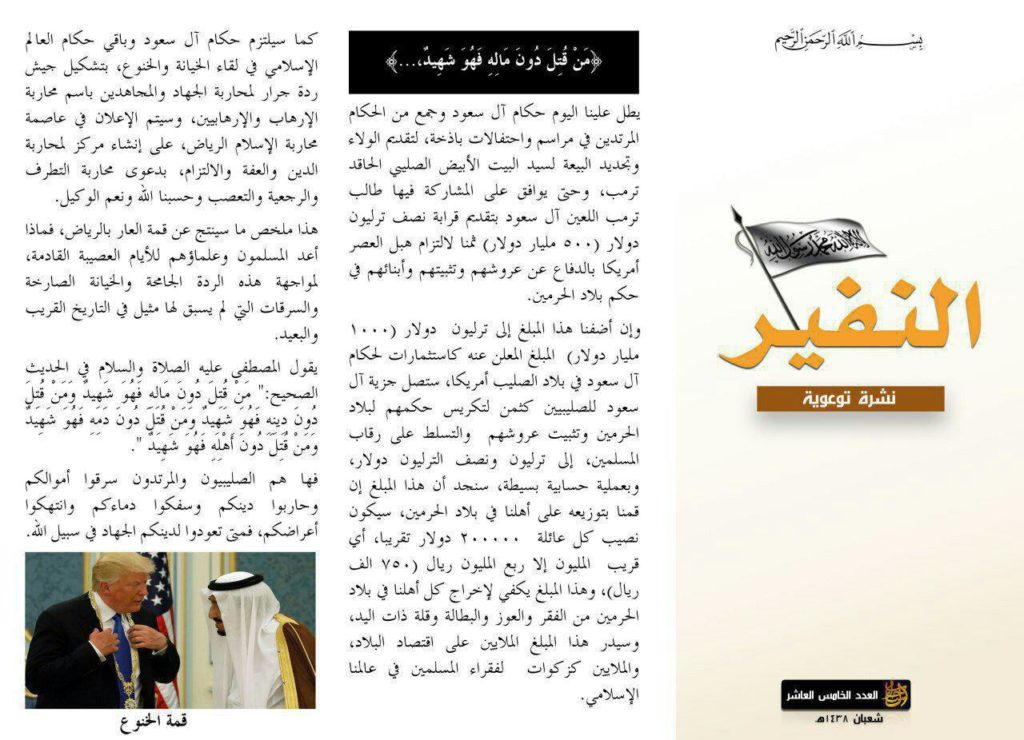
Al Qaeda seized on President Donald J. Trump’s recent visit to Saudi Arabia to once again criticize the royal family and call for an uprising.
On May 20, al Qaeda’s propaganda arm, As Sahab, released an audio message from Hamza bin Laden. The junior bin Laden follows in his father’s footsteps by blasting the Saudi royal family. His speech is the second part in a series aimed at the House of Saud. Part 1, in which Hamza called for regime change, was released last August.
It’s not clear when Hamza recorded his latest anti-Saudi message. He does not mention President Trump or the American delegation. Instead, he focuses on the early decades of the Saudi dynasty, portraying it as a corrupt regime that serves the interests of the West. Still, al Qaeda undoubtedly wanted to maximize the audience for Hamza’s audio by releasing it during President Trump’s visit.
Then, on May 21, al Qaeda published the 15th issue of its Al Nafir Bulletin (seen below). The one-page newsletter is devoted to Trump’s visit. “The Al Saud rulers and all apostate rulers appear before us today in wasteful ceremonies to offer loyalty and renew their allegiance to the hateful Crusader master of the White House, Trump,” the newsletter reads.

Just hours before Al Nafir was released online, President Trump attended a ceremony with King Salman and Egyptian President Abdel Fatah al-Sissi to commemorate the opening of the Global Center for Combating Extremist Ideology in Riyadh. Unsurprisingly, Al Nafir’s editors criticize the move, arguing that the “rulers” had really committed to building “an apostate army to fight jihad and the Mujahideen in the name of fighting terror and terrorism.” The center will be used “to fight faith, purity, and commitment, under the call to fight extremism, backwardness, and intolerance,” al Qaeda contends.
In Al-Nafir, al Qaeda also argues that the Saudi government should give its money to the people instead of investing it in defense deals and other arrangements with the US. Al Qaeda uses these two issues — the Saudis’ supposed misuse of funds and the creation of the new center — to renew its call for jihad.
“So here are the Crusaders and the apostates, and they have stolen your money, fought your religion, shed your blood, and transgressed against your honor,” Al Nafir reads. “When will you return to your religion and do jihad in the cause of Allah?”
Hamza bin Laden’s critique of Ibn Saud
Al Qaeda has been raising Hamza’s media profile since the summer of 2015, when he was first introduced as a prominent jihadist figure. On May 13, just one week before Hamza’s new anti-Saudi message, As Sahab released another speech from Osama’s heir. In that talk, Hamza provided advice to “martyrdom seekers” living in the West. [See FDD’s Long War Journal report: Hamza bin Laden offers ‘advice for martyrdom seekers in the West’]
In his latest message, Hamza accuses the Saudi government of promulgating a false version of its own history, arguing that “generations have been raised” ignorant of what truly transpired during the first years of the 20th Century, when the House of Saud rose. Bin Laden is keen to undermine King Abdul Aziz bin Abdul Rahman Al Saud’s (Ibn Saud) legacy, portraying him as a witting agent of the British. Only when the proper history is told, Hamza says, will Muslims “understand the magnitude of the injustice brought upon” their country and then work to “restore” their “stolen rights.”
Bin Laden accuses Ibn Saud of working with the British from the beginning, seeking their “approval” before leaving Kuwait (where the Saud family lived) and conquering the city of Riyadh in 1902. Riyadh and large parts of the Arabian peninsula were controlled by Ibn Rashid’s men, who were allied with the Ottoman Empire at the time. Bin Laden says Ibn Saud could only expand his power at the expense of the Ottoman Empire’s allies and he sought assistance from the British to do it. This, from al Qaeda’s perspective, violates Islamic law, as Ibn Saud attacked fellow Muslims while working with the British.
According to bin Laden, the Saudi telling of Ibn Saud’s early conquests omits these “sharia violations,” including the assault on the Ottoman’s ally “to serve the English” and the “unlawful killing of Muslims.”
In the period leading up to World War I, the Ottoman government sought to reconcile the opposing forces inside the Arabian Peninsula. And so a deal was struck between the Ottomans and Ibn Saud, which granted the Saudi patriarch territorial rights in exchange for military cooperation and an agreement to prevent “foreign powers” from expanding their influence in the region. But Ibn Saud broke this agreement as well, bin Laden says, after he again sided with the British. (Ibn Saud’s territory was declared a British protectorate as part of a treaty in 1915.) Ibn Saud moved on the Turks’ main client, Ibn Rashid, despite their previous understanding. In so doing, bin Laden charges, the founder of the Saudi dynasty paved the way for “the English and their allies to occupy the homelands of the Muslims.”
Bin Laden reminds his audience that Captain William Henry Irvine Shakespear, a British emissary, served as Ibn Saud’s military adviser and had “command” of the Muslim forces while organizing “their ranks.” This was part of Britain’s broader “financial and military” support for Ibn Saud. This is all “clear evidence” of English support, bin Laden says, and led to “Crusader hegemony” over the region.
According to bin Laden, these early Saudi dealings with the West led to the British capture of Palestine and, later on, the establishment of the Israeli state.
Osama bin Laden liked to argue that there is a “Zionist-Crusader” conspiracy against Muslims. His son, Hamza, has continued with these theme, making it one of his central talking points and accusing the House of Saud of being part of it.







